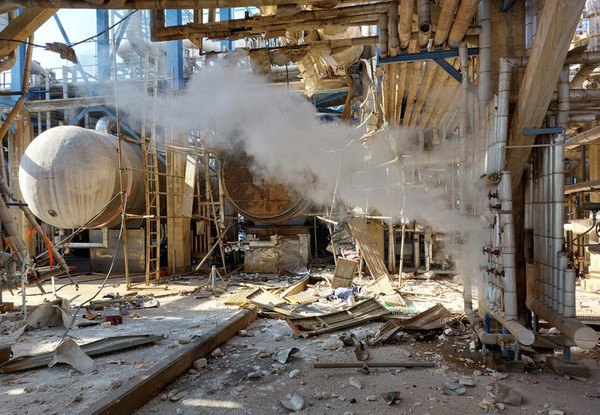Probe expands into workplace accidents amid confusion over new rules
A total of 11 workers died at worksites in a month after the new law took effect
By Kim Da-solPublished : Feb. 20, 2022 - 16:30

Authorities are widening investigations into a series of severe workplace accidents under a new industrial safety law, with businesses on high alert for its impact across industries.
According to the Labor Ministry Sunday, authorities have launched probes into a total of six cases, involving 11 deaths, since the law took effect on Jan. 27.
Many of the accidents occurred at construction sites. Three died in a landslide accident at Sampyo Industry’s quarry in Yangju, Gyeonggi Province on Jan. 29. An elevator mishap led to two deaths at a construction site of Yojin Construction in Pangyo, Gyeonggi Province on Feb. 8. An explosion at Yeocheon Naphtha Cracking Center’s Yeosu plant in South Jeolla Province on Feb. 11 left four dead and four injured. A dump truck driver died at Hansol Papertech’s Damyang plant in South Jeolla Province on Feb. 11. A worker fell at a highway construction site of Hyundai Engineering & Construction in Guri, Gyeonggi Province, on Wednesday.
On Friday, 16 workers at Doosung Industry in Changwon, South Gyeongsang Province, also reported acute poisoning from trichloromethane during the product clearing process.
For the first Sampyo case, the ministry charged its CEO over the breach of the law earlier this month. The new industrial safety law can send company executives to prison for a year or give a fine of up to 1 billion won ($836,300) under circumstances where safety measures are deemed insufficient.
Of the nation’s big conglomerates, Hyundai E&C, one of the top 10 builders, is the first to be probed under the new law.
Separate investigations are underway into recent high-profile accident cases, including a deadly apartment collapse in January in Gwangju, South Jeolla Province, as they occurred after the implementation of the new law.
Companies are bolstering responsiveness to the new law by coming up with new safety measures in consultation with law firms, amid confusions lingering over the ambiguity of the new regulations.
“To punish a CEO based on the industrial safety law, there should be clear evidence that the CEO did not follow the safety regulation and thus caused the fatal accident,” said a lawyer covering industrial accident cases at a local law firm. “Because there is no precedent for now, it is difficult to predict the ruling.”
Others also point to a legal loophole, as 80 percent of fatal worksite accidents take place at companies with less than 50 employees. The new law only holds companies with above 50 employees accountable for responsibility following worksite accidents.
In less than a month after the new law was introduced, nine companies were freed from the ministry’s investigations because they had less than 50 employees.
Worksite accident cases with different backgrounds under obscure standards are causing headaches for ministry officials as well.
According to the Labor Ministry Sunday, authorities have launched probes into a total of six cases, involving 11 deaths, since the law took effect on Jan. 27.
Many of the accidents occurred at construction sites. Three died in a landslide accident at Sampyo Industry’s quarry in Yangju, Gyeonggi Province on Jan. 29. An elevator mishap led to two deaths at a construction site of Yojin Construction in Pangyo, Gyeonggi Province on Feb. 8. An explosion at Yeocheon Naphtha Cracking Center’s Yeosu plant in South Jeolla Province on Feb. 11 left four dead and four injured. A dump truck driver died at Hansol Papertech’s Damyang plant in South Jeolla Province on Feb. 11. A worker fell at a highway construction site of Hyundai Engineering & Construction in Guri, Gyeonggi Province, on Wednesday.
On Friday, 16 workers at Doosung Industry in Changwon, South Gyeongsang Province, also reported acute poisoning from trichloromethane during the product clearing process.
For the first Sampyo case, the ministry charged its CEO over the breach of the law earlier this month. The new industrial safety law can send company executives to prison for a year or give a fine of up to 1 billion won ($836,300) under circumstances where safety measures are deemed insufficient.
Of the nation’s big conglomerates, Hyundai E&C, one of the top 10 builders, is the first to be probed under the new law.
Separate investigations are underway into recent high-profile accident cases, including a deadly apartment collapse in January in Gwangju, South Jeolla Province, as they occurred after the implementation of the new law.
Companies are bolstering responsiveness to the new law by coming up with new safety measures in consultation with law firms, amid confusions lingering over the ambiguity of the new regulations.
“To punish a CEO based on the industrial safety law, there should be clear evidence that the CEO did not follow the safety regulation and thus caused the fatal accident,” said a lawyer covering industrial accident cases at a local law firm. “Because there is no precedent for now, it is difficult to predict the ruling.”
Others also point to a legal loophole, as 80 percent of fatal worksite accidents take place at companies with less than 50 employees. The new law only holds companies with above 50 employees accountable for responsibility following worksite accidents.
In less than a month after the new law was introduced, nine companies were freed from the ministry’s investigations because they had less than 50 employees.
Worksite accident cases with different backgrounds under obscure standards are causing headaches for ministry officials as well.







![[Graphic News] More Koreans say they plan long-distance trips this year](http://res.heraldm.com/phpwas/restmb_idxmake.php?idx=644&simg=/content/image/2024/04/17/20240417050828_0.gif&u=)
![[KH Explains] Hyundai's full hybrid edge to pay off amid slow transition to pure EVs](http://res.heraldm.com/phpwas/restmb_idxmake.php?idx=644&simg=/content/image/2024/04/18/20240418050645_0.jpg&u=20240419100350)






![[From the Scene] Monks, Buddhists hail return of remains of Buddhas](http://res.heraldm.com/phpwas/restmb_idxmake.php?idx=652&simg=/content/image/2024/04/19/20240419050617_0.jpg&u=20240419175937)

![[KH Explains] Hyundai's full hybrid edge to pay off amid slow transition to pure EVs](http://res.heraldm.com/phpwas/restmb_idxmake.php?idx=652&simg=/content/image/2024/04/18/20240418050645_0.jpg&u=20240419100350)

![[Today’s K-pop] Illit drops debut single remix](http://res.heraldm.com/phpwas/restmb_idxmake.php?idx=642&simg=/content/image/2024/04/19/20240419050612_0.jpg&u=)